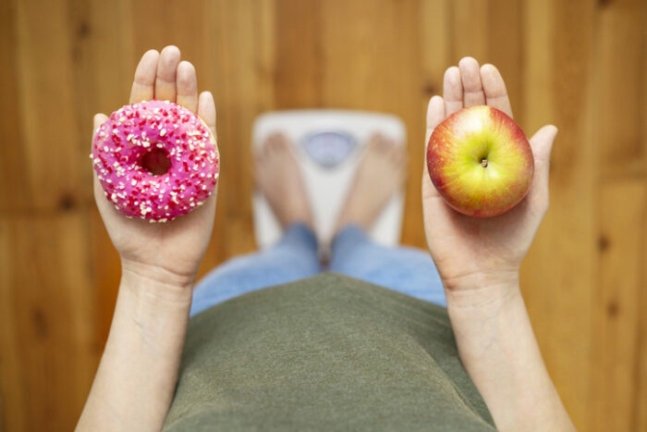
[Healthy Eating Show] Even if I eat less, I still gain weight... Is it because of 'this'?
2024.07.22 19:10
Views Likes Scraps
It seems that delicious foods always turn out to be poisonous.. Sigh..
Still, isn't it okay sometimes? Hahaha... ㅠ_ㅠ
Overconsumption is the problem, right? Of course... haha
Is the problem that you're overeating and not eating a balanced diet...?
If you think about nutrients and calories and eat well...
Sometimes I just let it go... haha
------------------------------------------------------

When you see the word "empty calories," you might think it refers to foods with no calories. However, this term actually refers to foods that lack nutritional value but are high in calories. These are typically foods made primarily of sugars or fats that provide little satiety. Examples include snacks, donuts, cakes, carbonated drinks, and alcohol.
High-calorie, high-fat donuts and cakes are empty-calorie foods... Excessive consumption increases the risk of cardiovascular disease.
Donuts and cakes, which are often eaten as snacks, contain almost no protein or vitamins. On the other hand, they are excessively high in calories and contain a lot of saturated and trans fats. Excessive intake of these fats increases the risk of obesity, as well as cardiovascular diseases such as arteriosclerosis and myocardial infarction.
Trans fats, once inside the body, are not easily expelled and can be deadly to health even in small amounts. According to the World Health Organization, trans fats should make up less than 1% of total energy intake. For an adult consuming 2000 kcal per day, this means consuming less than approximately 2.2 grams of trans fats.
Due to their liquid nature, carbonated drinks with low satiety and high sugar content should be consumed with caution... Alcohol is also a typical empty-calorie food.
The same applies to carbonated drinks. They are high in calories but provide little satiety because they are liquids. Drinking other foods because you don't feel full ultimately harms your health. You should also be cautious about the fact that they are severely lacking in vitamins and minerals compared to their sugar content. They are composed of sugar and liquid glucose, which cause a rapid increase in blood sugar levels. At this time, our body secretes insulin to lower blood sugar. Drinking these beverages frequently increases the risk of diabetes due to excessive insulin secretion. Excess glucose in the body is converted into fat, which can also lead to obesity.
Alcohol cannot be excluded from empty-calorie foods. Alcohol, which has 7 kcal per gram, has a higher calorie content than carbohydrates and proteins, but provides no nutritional value whatsoever. In fact, alcohol promotes fat accumulation and raises cortisol levels, leading to belly fat. It also interferes with the synthesis and maintenance of proteins necessary for muscle growth. Even alcohol in unsweetened drinks can hinder dieting on its own. When alcohol enters the body, it increases triglyceride levels during the metabolic process. It can even paralyze nerve cells in the brain, causing hunger even when not feeling hungry. At this point, pairing high-calorie snacks with alcohol is essentially taking the direct route to obesity.
Check your eating habits and ensure you get a variety of nutrients... develop a habit of eating vegetables and nuts as snacks.
If you have been dieting for a long time but still cannot reach your target weight, it is necessary to review your eating habits. Make sure to include the three essential nutrients for our body (carbohydrates, proteins, and fats) while ensuring that vitamins, minerals, and dietary fibers are not lacking. It is helpful to keep a record of what foods you usually eat, how much empty-calorie foods you consume in different situations, and to identify your patterns.
If you frequently snack on low-calorie foods, finding alternative foods can also help with dieting. It is recommended to develop a habit of eating vegetables that are rich in various nutrients, water, and dietary fiber, or nuts that contain unsaturated fatty acids and antioxidants. In fact, there are studies showing that eating nuts just two or three times a week can reduce the risk of weight gain and diabetes.
⟨3-line summary⟩
Empty calorie foods are low in nutrients, high in calories, and have high sugar and fat content with little satiety.
✔ Donuts and cakes are high in calories and contain a lot of saturated and trans fats, increasing the risk of obesity and cardiovascular disease.
✔ Ensure the three major nutrients while also taking vitamins, minerals, and dietary fiber, and incorporate vegetables and nuts.
'Healthy' 'Eating' Information 'Room', Healthy Eating Show is a corner that addresses questions about frequently consumed foods. A journalist with a background in food and nutrition will easily explain nutritional information that is often overlooked in daily life.
2
0
Comments 4